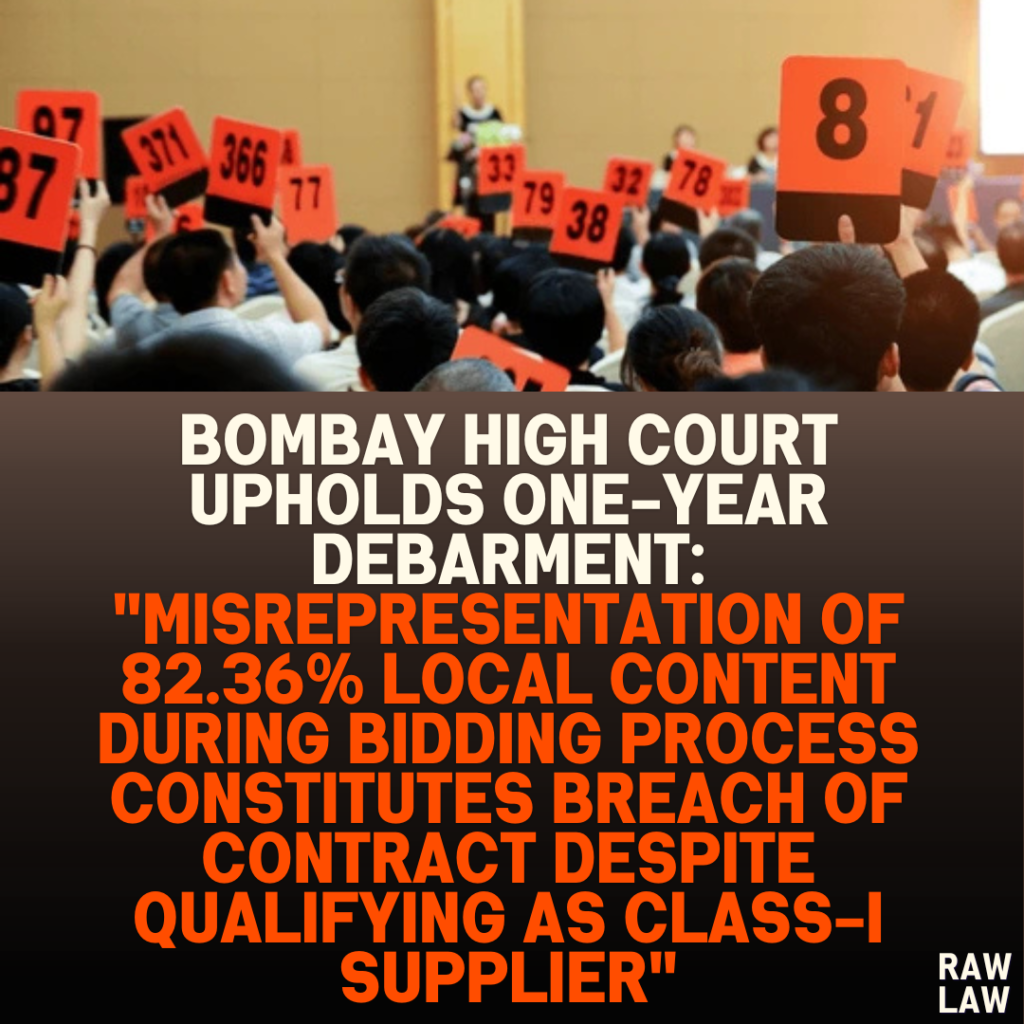Court’s Decision:
The Bombay High Court dismissed the writ petition filed by the petitioner challenging the one-year debarment imposed by Bharat Petroleum Corporation Limited (BPCL) for misrepresenting the local content in its bid and subsequently abandoning the contract. The Court held that the petitioner’s inability to fulfill its declared commitment of 82.36% local content constituted a breach of contract. The debarment was found to be in accordance with the terms of the tender and the policy on Holiday Listing.
Facts:
- Tender and Policy Applicability: The petitioner, a partnership firm dealing in polyethylene pipes, participated in a tender issued by BPCL for the supply of MDPE pipes under the “Purchase Preference Linked with Local Content” (PPLC) policy. As per the tender requirements, only “Class 1 and Class 2 local suppliers” were eligible to bid.
- Local Content Declaration: The petitioner submitted a declaration stating that its pipes had a local content of 82.36%. Based on this declaration, BPCL accepted its bid.
- Dispute over Compliance: After the issuance of a purchase order, BPCL received information indicating that the raw material used by the petitioner to manufacture the pipes was imported from the UAE, reducing the local content to 51.45%.
- Subsequent Communication: In response, the petitioner admitted that its initial declaration was not executable and that the local content of its product was only 51.45%. The petitioner argued that this still qualified it as a Class-I supplier, but BPCL maintained that this amounted to a misrepresentation, thereby violating the PPLC policy and the terms of the tender.
- Show Cause Notice and Debarment: BPCL issued a show cause notice and subsequently banned the petitioner for one year from entering into future contracts, citing breach of contract and misrepresentation of local content.
Issues:
- Whether the petitioner’s inability to provide pipes with 82.36% local content as declared during the bidding process constitutes a breach of contract.
- Whether the debarment of the petitioner for one year was in accordance with the terms of the PPLC policy and the Holiday Listing Policy.
Petitioner’s Arguments:
- Misinterpretation of Local Content: The petitioner argued that the declaration of 82.36% local content was made based on a good faith interpretation of the policy, and that any deviation was due to ambiguity in the policy.
- Doctrine of Proportionality: The petitioner contended that the debarment was disproportionate given that it still qualified as a Class-I supplier with 51.45% local content.
- No Intent to Mislead: It was submitted that there was no intention to mislead BPCL and that the inability to meet the declared local content did not amount to abandonment of the contract.
Respondent’s Arguments:
- Breach of Contract and Abandonment: BPCL argued that the petitioner’s declaration of 82.36% local content was a key factor in awarding the tender. The subsequent revision to 51.45% constituted a breach and abandonment of the contract.
- Sanctions under the PPLC Policy: BPCL highlighted that under the PPLC policy, violations of the local content criteria could result in sanctions, including blacklisting and financial penalties.
- Fair Hearing: The respondent asserted that due process was followed, as the petitioner was given an opportunity to respond to the show cause notice.
Analysis of the Law:
- Contractual Obligations under the PPLC Policy: The Court noted that under the PPLC policy, the local content of goods must be adhered to as per the declaration made in the bid submission. Any deviation post-award would amount to a breach unless supported by a legitimate explanation.
- Provisions for Sanctions: The Court observed that Clause 9 of the PPLC policy provides for various sanctions, including blacklisting and financial penalties. The one-year debarment imposed was less severe than the maximum period of three years for such breaches.
- Doctrine of Proportionality: While acknowledging the applicability of the doctrine of proportionality in administrative actions, the Court held that the one-year debarment was justified given the nature of the breach and the absence of mala fide intent.
Precedent Analysis:
The Court referenced established principles on breach of contract and the doctrine of proportionality, stating that sanctions must be proportionate to the gravity of the breach. The petitioner’s inability to supply pipes with the declared local content undermined the purpose of the PPLC policy, warranting the debarment.
Court’s Reasoning:
The Court reasoned that the petitioner’s misrepresentation of local content during the bid process and subsequent admission that the declared content was not achievable, amounted to a breach of the terms of the contract. The petitioner’s argument that it still qualified as a Class-I supplier was dismissed, as the tender was awarded based on the specific declaration of 82.36%.
Conclusion:
The Court upheld BPCL’s decision to debar the petitioner for a period of one year, finding that the impugned order did not suffer from any procedural or substantive illegality.
Implications:
This decision underscores the importance of adhering to the terms and conditions outlined in tender documents, especially concerning policies like the PPLC. The judgment also highlights that misrepresentation, even if unintentional, can lead to severe consequences, including debarment or blacklisting, thereby affecting the future prospects of contractors.



